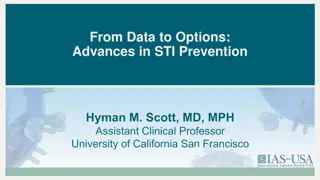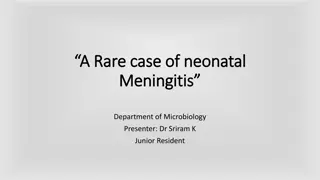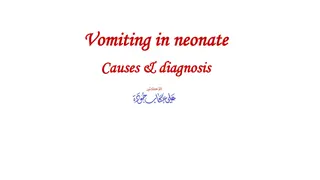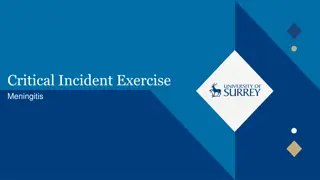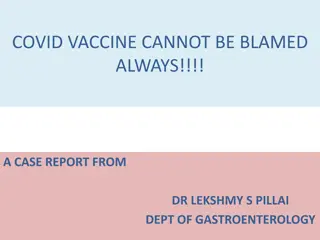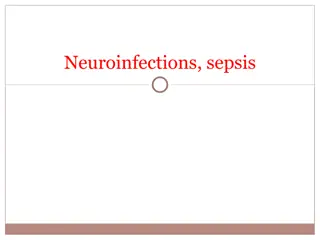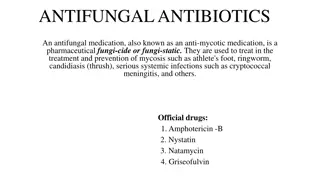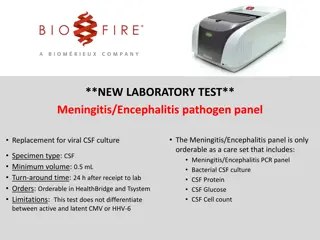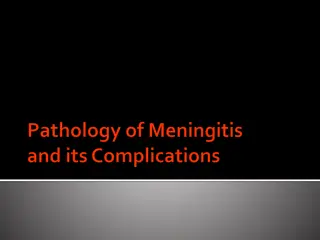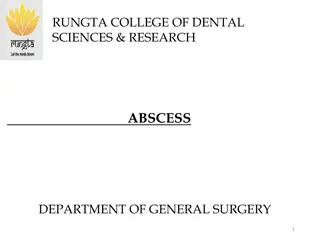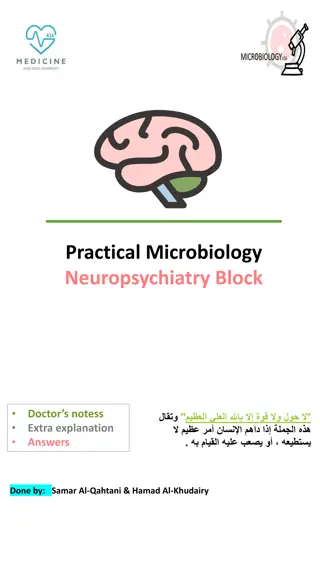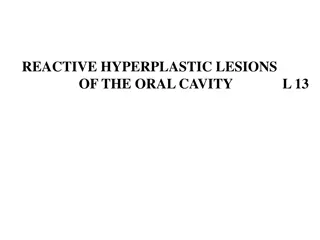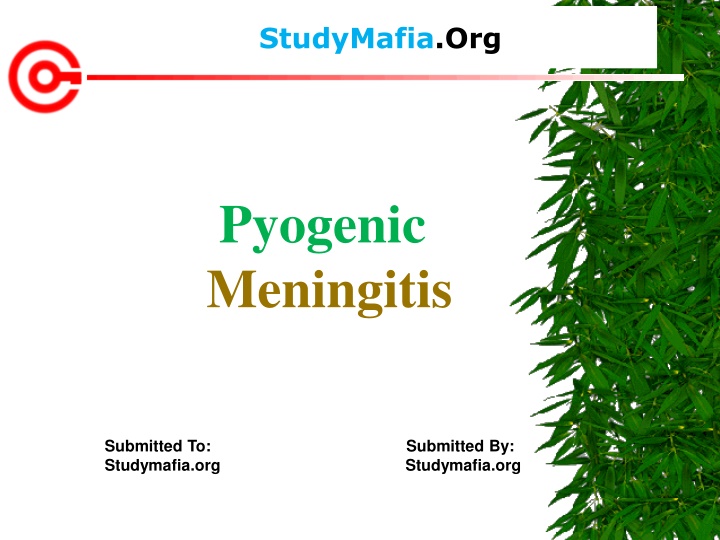
Pyogenic Meningitis: Symptoms, Complications & Treatment
Learn about pyogenic meningitis, a life-threatening bacterial infection affecting the CNS. Discover symptoms, complications, risk factors, prevention, and treatment options to address this serious condition promptly.
Download Presentation

Please find below an Image/Link to download the presentation.
The content on the website is provided AS IS for your information and personal use only. It may not be sold, licensed, or shared on other websites without obtaining consent from the author. If you encounter any issues during the download, it is possible that the publisher has removed the file from their server.
You are allowed to download the files provided on this website for personal or commercial use, subject to the condition that they are used lawfully. All files are the property of their respective owners.
The content on the website is provided AS IS for your information and personal use only. It may not be sold, licensed, or shared on other websites without obtaining consent from the author.
E N D
Presentation Transcript
StudyMafia.Org Pyogenic Meningitis Submitted To: Submitted By: Studymafia.org Studymafia.org
Content Introduction Overview Symptoms Complications Risk-Factors Prevention Treatment Conclusion
Overview Pyogenic meningitis, also referred as bacterial meningitis, is a life- threatening CNS infectious disease affecting the meninges, with elevated mortality and disability rates. Three bacteria (Haemophilus influenzae, Streptococcus pneumoniae, Neisseria meningitidis) account for the majority of cases 4,5.
Introdction Meningitis is an infection and inflammation of the fluid and membranes surrounding the brain and spinal cord. These membranes are called meninges. The inflammation from meningitis typically triggers symptoms such as headache, fever and a stiff neck. Most cases of meningitis in the United States are caused by a viral infection. But bacteria, parasites and fungi also can cause it. Some cases of meningitis improve without treatment in a few weeks. Others can cause death and require emergency antibiotic treatment. Seek immediate medical care if you suspect that you or someone in your family has meningitis. Early treatment of bacterial meningitis can prevent serious complications.
Symptoms Symptoms Early meningitis symptoms may be similar to the flu. Symptoms may develop over several hours or over a few days. Possible symptoms in anyone older than the age of 2 years include: Sudden high fever. Stiff neck. Severe headache. Nausea or vomiting. Confusion or trouble concentrating. Seizures. Sleepiness or trouble waking. Sensitivity to light. No appetite or thirst. Skin rash in some cases, such as in meningococcal meningitis.
Signs in Newborns Signs in Newborns Newborns and infants may show these signs: High fever. Constant crying. Being very sleepy or irritable. Trouble waking from sleep. Being inactive or sluggish. Not waking to eat. Poor feeding. Vomiting. A bulge in the soft spot on top of the baby's head. Stiffness in the body and neck. Infants with meningitis may be hard to comfort. They may even cry harder when held.
When to see a doctor When to see a doctor Seek immediate medical care if you or someone in your family has meningitis symptoms, such as: Fever. Severe headache that doesn't go away. Confusion. Vomiting. Stiff neck. Bacterial meningitis is serious and can cause death within days without prompt antibiotic treatment. Delayed treatment also increases the risk of permanent brain damage. It's also important to talk to your health care provider if you've been exposed to someone with meningitis. That may include a family member or someone you live or work with. You may need to take medicines to prevent getting an infection.
Complications Complications Meningitis complications can be severe. The longer you or your child has the disease without treatment, the greater the risk of seizures and permanent neurological damage, including: Hearing loss. Memory problems. Learning disabilities. Brain damage. Trouble walking. Seizures. Kidney failure. Shock. Death. With prompt treatment, even people with severe meningitis can have good recovery.
Risk factors Risk factors Skipping vaccinations. Risk rises for anyone who hasn't completed the recommended childhood or adult vaccination schedule. Age. Most cases of viral meningitis occur in children younger than age 5 years. Bacterial meningitis is common in those under age 20. Living in a community setting. College students living in dormitories, personnel on military bases, and children in boarding schools and child care facilities are at greater risk of meningococcal meningitis. This is probably because the bacterium is spread through the respiratory route, and spreads quickly through large groups.
Pregnancy. Pregnancy increases the risk of an infection caused by listeria bacteria, which also may cause meningitis. The infection increases the risk of miscarriage, stillbirth and premature delivery. Weakened immune system. AIDS, alcohol use disorder, diabetes, use of immunosuppressant drugs and other factors that affect your immune system increase the risk of meningitis. Having a spleen removed also increases risk. People without a spleen should get vaccinated to lower the risk.
Prevention These steps can help prevent meningitis: Wash your hands. Careful hand-washing helps prevent the spread of germs. Teach children to wash their hands often, especially before eating and after using the toilet, spending time in a crowded public place or petting animals. Show them how to thoroughly wash and rinse their hands. Practice good hygiene. Don't share drinks, foods, straws, eating utensils, lip balms or toothbrushes with anyone else. Teach children and teens to avoid sharing these items too.
Stay healthy. Maintain your immune system by getting enough rest, exercising regularly, and eating a healthy diet with plenty of fresh fruits, vegetables and whole grains. Cover your mouth. When you need to cough or sneeze, be sure to cover your mouth and nose. If you're pregnant, take care with food. Reduce your risk of a listeria infection by cooking meat, including hot dogs and deli meat, to 165 degrees Fahrenheit (74 degrees Celsius). Avoid cheeses made from unpasteurized milk. Choose cheeses that are clearly labeled as being made with pasteurized milk.
Treatment and prognosis Treatment and prognosis Empirical antimicrobial therapy for purulent meningitis is guided by the age of the patient. The adult case fatality has a straight correlation with increasing age, the overall rate is estimated at around 16% in the USA, ranging from ~9% among patients 18 to 34 years of age vs. ~23% among those older than 65 years.
References Google.com Wikipedia.org Studymafia.org Slidespanda.com
Thanks Thanks To To StudyMafia StudyMafia.org .org

